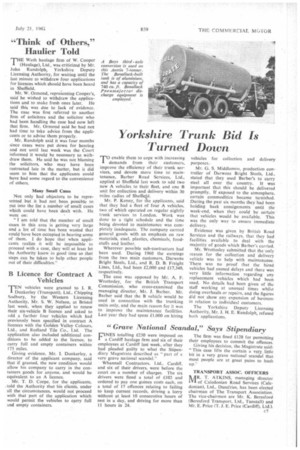Yorkshire Trunk Bid Is
Page 43

If you've noticed an error in this article please click here to report it so we can fix it.
Turned Down TO enable them to cope with increasing demands from their customers, improve the efficiency of their trunk services, and devote more time to maintenance, Barber Road Services, Ltd., applied at Sheffield last week to add two new A vehicles to their fleet, and one B unit for collection and delivery within 30 miles radius of Sheffield.
Mr. P. Kenny, for the applicants, said that they had a fleet of four A vehicles, two of which operated on regular nightly trunk services to London. Work was done to a tight schedule and the time being devoted to maintenance was completely inadequate. The company carried general goods with an emphasis on raw materials, steel, plastics, chemicals, foodstuffs and leather.
Wherever possible sub-contractors had been used. During 1960 the earnings from the two main customers, Darwens Bright Steels, Ltd., and R. D. 11 Freight Lines, Ltd., had been £2,000 and £17,340. respectively.
The case was opposed by Mr. A. F. Wrottesley, for the British Transport Commission, who cross-examined the managing director. Mr. J. Barber. Mr. Barber said that the B vehicle would be used in connection with the trunking units only, and the main reason for it was to improve the maintenance facilities. Last year they had spent £1.000 on hiring vehicles for collection and delivery purposes.
Mr. G. S. Middlemiss, production controller of Darwens Bright Steels, Ltd., stated that they used Barber's to carry steel all over the country. It was important that this should be delivered promptly. If exposed to the atmosphere, certain commodities became tarnished. During the past six months they had been holding back consignments until the week-end, when they could be certain that vehicles would be available. This was the only way to ensure immediate delivery.
Evidence was given by British Road Services and the railways, that they had facilities available to deal with the majority of goods which Barber's carried.
Mr. Wrottesley submitted that the 'only reason for the collection and delivery vehicle was to help with maintenance. There was no proof that the hired vehicles had caused delays and there was very little information regarding any replacement vehicles which had been used. No details had been given of the staff working at unusual times whilst doing overhauls or repairs, and the figures did not show any expansion of business in relation to individual customers.
The Yorkshire Deputy Licensing Authority, Mr. J. H. E. Randolph, refused both applications.
























































































































